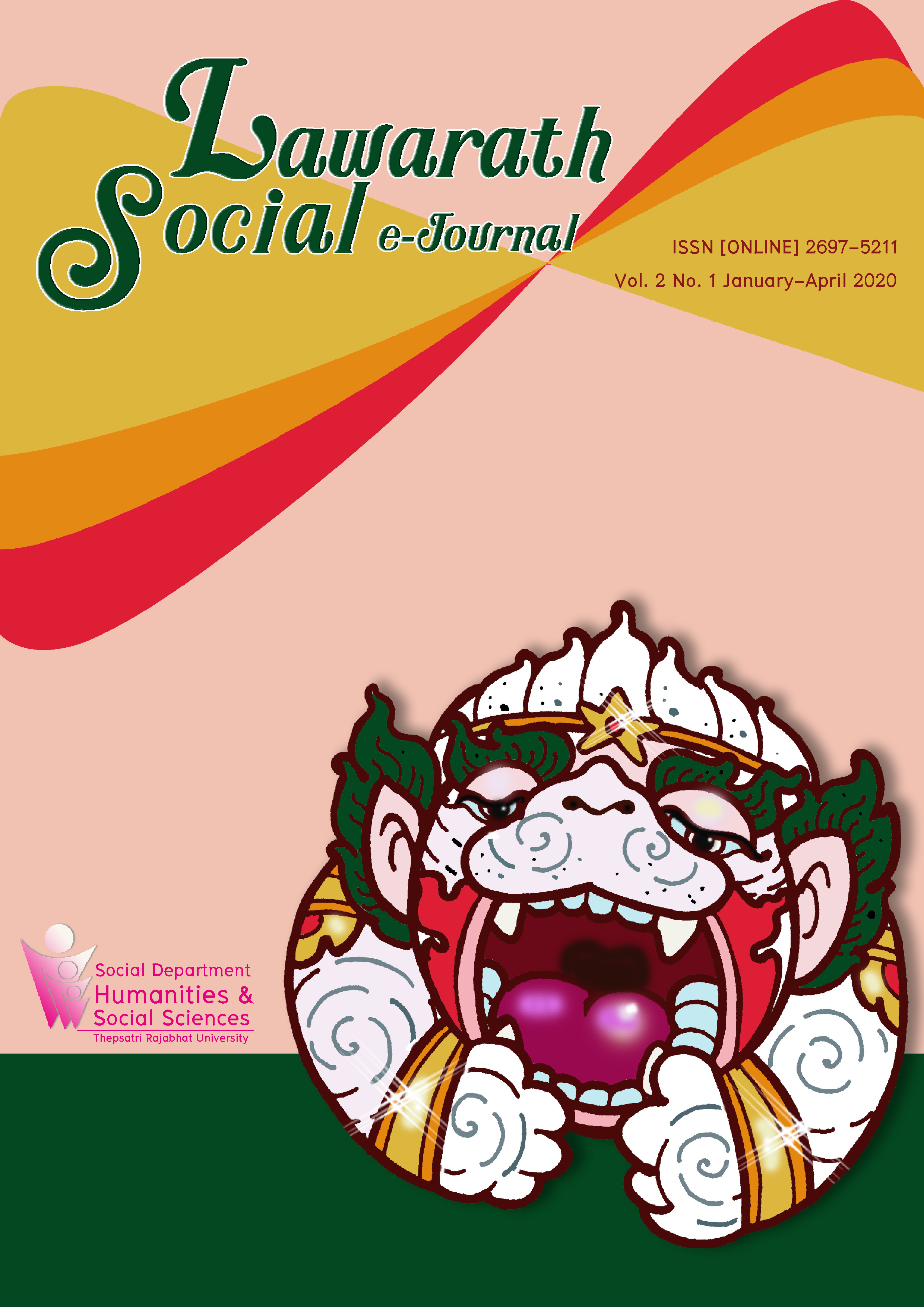The management of quality management of tourism under Thailand 4.0 policy in Bang Saphan district, Prachuap Khiri Khan
The management of quality management of tourism under Thailand 4.0 policy in Bang Saphan district, Prachuap Khiri Khan
Keywords:
management, quality management, policy Thailand 4.0, tourismAbstract
The objective of the study were 1) to study level of management of quality management of tourism under Thailand 4.0 policy 2) to study Thailand 4.0 policy and 3) to study Thailand 4.0 policy that have causal and effectual relation with management of quality management of tourism under Thailand 4.0 policy in Bang Saphan district, Prachuap Khiri Khan. The sample was selected from 130 cases were included as sample; hotel entrepreneur, SME entrepreneur and OTOP entrepreneur. The statistics used for frequency, percentage, mean, standard deviation, inferential statistics, multiple linear regression and Chi-square test. Research findings were as follows: 1) The management of quality management of tourism under Thailand 4.0 policy is at moderate level in terms of overall image and incomes. 2) Thailand 4.0 policy in management of quality management of tourism is at moderate level with regard to the overall image and incomes. 3) Thailand 4.0 policy in modern marketing for the future change, in tourism innovation startup, making efficiently cooperative network, causal and effectual relation with management of quality management of tourism under Thailand 4.0 policy in relation with statistical significance at the level of 0.01. The management of quality management of sustainable tourism has causal and effectual relation with statistical significance at the level of 0.01. And personality in career has relation with management of quality management of tourism under Thailand 4.0 policy with statistical significance at the level of 0.01 and educational level with management of quality management of tourism under Thailand 4.0 policy in Bang Saphan district, Prachuap Khiri Khan with statistical significance at the level of 0.01.
Downloads
References
กระทรวงการท่องเที่ยวและกีฬา. (2558). ยุทธศาสตร์การท่องเที่ยวไทยพ.ศ. 2558 – 2560. กรุงเทพฯ: ผู้แต่ง.
กองบริหารงานวิจัยและประกันคุณภาพการศึกษา. (2559). พิมพ์เขียว Thailand 4.0 โมเดลขับเคลื่อนประเทศไทยสู่ความมั่งคั่ง มั่นคง และยั่งยืน. กองบริหารงานวิจัยและประกันคุณภาพการศึกษา.
กรุงเทพธุรกิจ. (2560). ททท.ดัน “ท่องเที่ยว 4.0” เคลื่อนเศรษฐกิจ. สืบค้น เมษายน 15, 2561, จาก https://www.bangkokbiznews.com/news/detail/756663.
คณะกรรมการนโยบายการท่องเที่ยวแห่งชาติ. (2560). เเผนพัฒนาการท่องเที่ยวแห่งชาติ ฉบับที่ 2 (พ.ศ. 2560 – 2564). กรุงเทพฯ: ผู้แต่ง.
พงษ์ศักดิ์ เพชรสถิต. (2558). ยุทธศาสตร์การบริหารจัดการการท่องเที่ยวอย่างยั่งยืนของจังหวัดกำแพงเพชร. วิทยานิพนธ์ปริญญาดุษฎีบัณฑิต มหาวิทยาลัยราชภัฏวไลยอลงกรณ์.
มาลินี ศรีไมตรี. (2559). การพัฒนารูปแบบและศักยภาพของกลุ่มวิสาหกิจชุมชนด้านการท่องเที่ยวเชิงวัฒนธรรมตามอัตลักษณ์ของท้องถิ่นสู่นักท่องเที่ยวจังหวัดอุบลราชธานี. วารสารการบริการและการท่องเที่ยวไทย, 11(2).
รพีพรรณ จันทับ. (2558). ปัจจัยด้านอัตลักษณ์ทรัพยากรท่องเที่ยวที่มีผลต่อความสำเร็จในการจัดการการท่องเที่ยวหมู่บ้านช้างบ้านตากลาง จังหวัดสุรินทร์. วิทยานิพนธ์ปริญญามหาบัณฑิต มหาวิทยาลัยมหาสารคาม.
รัดเกล้า เปรมประสิทธิ์. (2556). โครงการแนวทางการพัฒนาการท่องเที่ยวอย่างยั่งยืน พื้นที่อำเภอเขาค้อ จังหวัดเพชรบูรณ์. วิทยานิพนธ์ปริญญามหาบัณฑิต มหาวิทยาลัยนเรศวร.
อธิษฐาน ใชยเรือง. (2559). ยุทธศาสตร์การพัฒนาการบริหารจัดการการท่องเที่ยวอย่างยั่งยืนตามเส้นทางแอ่งอารยธรรมขอม ในจังหวัดภาคตะวันออกเฉียงเหนือตอนล่าง. วิทยานิพนธ์ปริญญาดุษฎีบัณฑิต มหาวิทยาลัยราชภัฏวไลยอลงกรณ์.
อำนาจ รักษาพล. (2555). การประเมินประสิทธิภาพและประสิทธิผลการจัดการการท่องเที่ยวเชิงนิเวศโดยชุมชนเกาะยาวน้อย ตำบลเกาะยาวน้อย อำเภอเกาะยาว จังหวัดพังงา. กรุงเทพฯ: ภาควิชาอนุรักษวิทยา คณะวนศาสตร์ มหาวิทยาลัยเกษตรศาสตร์.
Deming, Edwards. W. (2000). The Deming Management Method. Massachusetts: MIT Press.
Greenl, Green, S. B. (1991). How Many Subjects Dose It Take to Do a Regression Analysis? Multivariate Behavioral Research, 26(3), 109-110. Retrieved March 18, 2018 from http://research.kbu.ac.th/home/journal/pdf/journal_v15_no1.pdf



